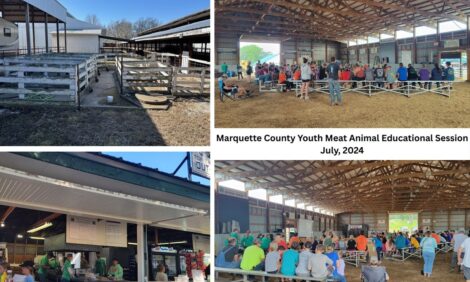



New Animal Health Lab Likely to be in Kansas
US - Although the official announcement is not due until 5 December, it has emerged that federal officials have chosen Manhatten, Kansas, as the site of the country's new National Bio- and Agro-Defense Facility (NBAF).Online Athens reports that federal officials chose Manhattan, Kansas over four other finalists for the National Bio- and Agro-Defense Facility, a 500,000-square-foot lab where more than 300 scientists and other employees will study pig and cattle diseases that terrorists could use to attack the US food supply.
Kansas always was Georgia's strongest competition for the NBAF, said University of Georgia (UGA) Vice-President for Research David Lee, who headed up efforts to bring the $700 million lab to a university-owned tract on South Milledge Avenue.
Kansas State University offers many of the same advantages as UGA, such as existing animal disease research programs to collaborate with federal scientists, but Kansas offered more incentives than Georgia to entice Homeland Security, Mr Lee said.
"I can't find any great fault with choosing the Kansas site," he said. "I happen to think our site was better."
Kansas could provide a better work force, offered more financial incentives and had less opposition from residents than other finalists, including sites near Durham, North Carolina, San Antonio and Jackson, Mississippi, Homeland Security Undersecretary, Jay Cohen, said in a memo obtained by the Associated Press.
The memo cites a relatively small incentive package, a lack of coordination among researchers, a focus on poultry research rather than livestock and strong community opposition as reasons not to select Athens.
"The site continued to experience strong federal level, state, and local political support, however the group For Athens Quality of Life (FAQ) is a well organized, vocal opposition, and expressed numerous concerns on siting the NBAF in Athens, Georgia," Cohen wrote. "Additionally, numerous negative comments about the project were received at public meetings."
Many of the more than 2,000 comments federal officials received dealt with safety. The lab's critics feared that viruses could escape, decimate livestock, deer and birds, put farmers out of business and potentially spread to humans. NBAF researchers would study the highly contagious foot-and-mouth disease, as well as African swine fever, Japanese encephalitis, Rift Valley fever, the Hendra virus and the Nipah virus.
All five finalists ranked about the same in terms of safety, according to the executive summary of a 1,000-plus-page study scheduled to be released on 5 or 12 December.
"The risk of an accidental release of a pathogen is extremely low, but DHS acknowledges that the possible effects would be significant for all sites," the summary said. "The primary economic effect of an accidental release would be the banning of U.S. livestock products regardless of the location of the accidental release. The economic effect which could reach as high as $4.2 billion until the United States was declared foreign animal disease-free and foreign trade could resume."
FAQ co-founder Grady Thrasher claimed some credit for convincing Homeland Security to look elsewhere, but said he thinks politics played a larger role. Kansas Governor Kathleen Sebelius, a Democrat, is close to President-elect Barack Obama, and the state has two Republican senators.
"I think we certainly were a factor," Thrasher said. "I don't know if we were the controlling factor."
Georgia officials offered an incentives package worth about $25 million, including upgraded water and sewer lines, road improvements and free land. Kansas' $105 million package dwarfed Georgia's, but state officials did not want to get into a bidding war, said Bert Brantley, a spokesman for Gov. Sonny Perdue.
"We can't just write checks," Brantley said. "We're limited in what we can do as far as incentives."
Incentives are rarely the sole deciding factor, anyway, when a company or other organization is choosing where to build a new facility, he said.
The NBAF is the third major employer in the bioresearch field that Athens has lost in the past three years, joining Novartis, a pharmaceutical company that elected to build in North Carolina, and Solvay, an influenza vaccine manufacturer that was leaning toward Alabama before deciding not to build a new plant at all.
The mere fact that Athens continues to make short lists bodes well for the city and state's efforts to draw employers in the bioresearch industry, Brantley said.
Senators Pat Roberts and Sam Brownback of Kansas leaked news of their state's selection on 3 December.
"On the merits, Kansas is the best place to conduct this much-needed research to keep America's dinner table safe," Roberts told the Topeka Capital-Journal.
A formal announcement is not scheduled until 5 December, and the choice will not become official until January, Homeland Security spokesman John Verrico said.
Brantley and Lee said Homeland Security officials haven't briefed them on the choice, and US Representative Paul Broun, R-Athens, said he still holds out hopes that the department will pick Athens.
"Certainly, it has been a very competitive process by all of the proposed sites, but I believe that, if it were considered strictly on merit, the Georgia location would far outshine any of the other proposed sites," Broun said in a news release concluding the report in Online Athens. "While this news may turn out to be true, I very much hope that the celebration in Kansas is premature and the information is incorrect."








